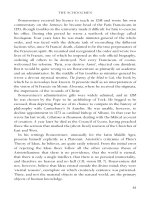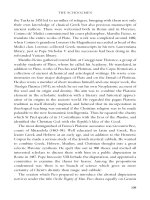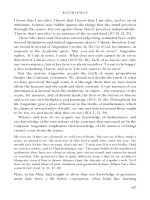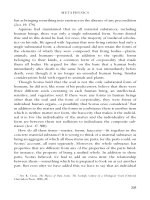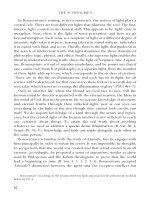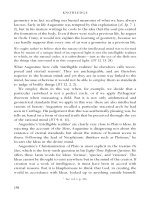Medieval philosophy a new history of western philosophy volume 2 ( PDFDrive ) 286
Bạn đang xem bản rút gọn của tài liệu. Xem và tải ngay bản đầy đủ của tài liệu tại đây (24.41 KB, 1 trang )
ETHICS
activity of virtue in which human Xourishing consists. Among these
ultimate principles is the biblical injunction to love one’s neighbour as
oneself: a principle that Aquinas regarded as the Wrst and common precept
of human nature, self-evident to human reason.4
Human legislators, the political community or its delegates, use their
reason to devise laws for the general good of particular states. But the
world as a whole is ruled by the reason of God. The eternal plan of
providential government, which exists in God as ruler of the universe, is
a law in the true sense. It is a natural law, inborn in all rational creatures in
the form of a natural tendency to pursue the behaviour and goals appropriate to them. It is this tendency that becomes articulate in the ultimate
principles of practical reason. This natural law is simply the sharing, by
rational creatures, in the eternal law of God. It obliges us to love God and
to love our neighbour as ourselves. It is by the application of this principle
that we reach speciWc moral rules to govern action in areas such as
homicide, sexual relations, and private property.
Aquinas as Moralist
In each of the areas identiWed above Aquinas laid down norms that are
issues of controversy at the present time, and to illustrate his approach to
moral issues we may consider examples from each in turn.
On the topic of warfare, Aquinas puts himself the question ‘Is soldiering
always a sin?’ (2a 2ae 40. 1). Following Augustine,5 Aquinas answers in the
negative, but lays down speciWc conditions for war-making to be lawful (2a
2ae 40. 1). The Wrst is authority: only a prince may lawfully make war: a
private citizen should take his grievances to court. Secondly, there must be
a just cause: the enemy must be guilty of fault—not necessarily military
aggression, but some violation of the rights of one’s community or one’s
allies. Thirdly, the intention of those making war must be right: they must
intend to promote good or to avoid evil. This appears to mean that the
forceful redress of an injury must not do more harm than leaving the
4 All this is very well explained in J. Finnis, Aquinas: Moral Political, and Legal Theory (Oxford:
Oxford University Press, 1998).
5 And also Alexander of Hales, one of the fullest early medieval theorists of the just war. See
Barnes, ‘The Just War’, in CHLMP 771–84.
267

